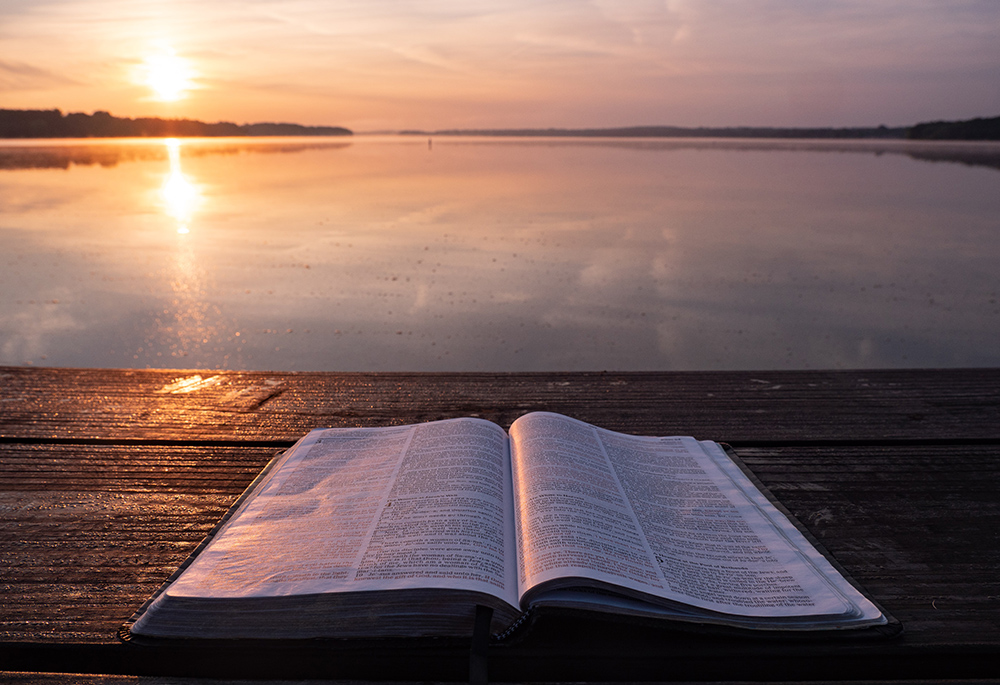
(Unsplash/Aaron Burden)
"The kingdom of heaven is at hand!"
"In that great gettin' up morning, fare thee well, fare thee well."
John the Baptist proclaimed the first of these statements, the second is from a traditional spiritual. Both refer to the coming of God's chosen redeemer-judge. In third grade, when I learned that the final judgment would reveal all our sins, I agonized over the fact that my teacher would know that I had whispered that I hated her. With images like John's winnowing fan and unquenchable fire, preaching about Christ's second coming is generally designed to inspire fear and repentance. I had gotten the message.
The spiritual, "In That Great Gettin' Up Morning," celebrates a joyous alternative to God's impending wrath. Perhaps because it springs from the heart of people who had been treated unjustly, the song proclaims judgment day as a day of jubilation.
For the singers, Isaiah's shout of, "On that day!" refers to the "great, great gettin' up morning," when God will tell Gabriel to blow the horn loud enough to awaken the nations but not to frighten God's people. The words, melody and rhythm of the song harmonize in a proclamation that God's people will rejoice on the day of judgment. The contrast in images between a day of wrath and that gettin' up morning invites us to think anew about the coming of God's reign and to let renewing images inspire us.
Isaiah unites images of past and future to inspire our present moment. He envisions the advent of a redeemer whose ancestral roots include the pagan widow Ruth, her son Jesse, and her grandson, King David. (See the Book of Ruth and 1 Samuel 16.) Isaiah says that God's envoy will perceive what lies deep behind every facade or humiliation. He will rectify injustice, unveiling the depths of each person. Tenderly loving the afflicted, the savior will call the wicked to account.
Isaiah wants to inspire dreams. He wants us to envision universal peace: a time when all creatures — from widow to queen, from lion to lamb — will have evolved beyond aggression because we enjoy and share everything necessary for genuine thriving. That's what life will be like on God's holy mountain.
The question is, how do we get there? Enter John the Baptist. Before we dwell on Isaiah's mountain, John draws us into the desert. John's desert isn't primarily a place of fear or want. In Israel's collective memory, the desert was an in-between space, a time and place of growth. While in that desert, they accused God and Moses of leading them out to die of thirst. They complained about missing the good food of Egypt. They spent some time practicing idolatry and they trembled at the signs of God's presence. Gradually, the former slaves became a people of God. In the austere and strangely fertile setting of the desert, a locale matched to his clothing and diet, John summoned his people to metanoia.
Advertisement
Metanoia, translated here as repentance, is quite distinct from being sorry and making a firm purpose of amendment. Metanoia is an exciting, life-giving shakeup and shift of outlook. John summoned his people to metanoia, not because they are sinners, but because the kingdom of heaven was at hand. Sorrowful repentance and metanoia propose quite different approaches to change. Repentance concentrates on self: myself as perpetrator and my offense. Metanoia is a response to an invitation that focuses on God's promise that something new is in the offing. It is an invitation to a conversion of mindset. It is so radical that we don't seem to have an English word capable of communicating it. Nevertheless, practicing it will change our lives.
John preached a message about God's future. He called it the kingdom of heaven; Isaiah described it as life on God's holy mountain. In his letter to the Romans, Paul spoke of it as the internal and collective harmony that flows from life in Christ Jesus.
John summarized his message with the proclamation: "Prepare the way of the Lord." He heralded something new. He did not belittle the temple and synagogue, but warned his audiences that membership in a religious tradition made them no holier than pavement stones. For John, belief necessarily included the zest for life that comes from the fire of the Holy Spirit.
John tells us to prepare, to ready ourselves for the coming of God's reign. Isaiah tells us that "the earth shall be filled with the knowledge of the Lord." Now is the time to envision what that can mean and to begin to act as if it were true. Now is the time to allow that great, great gettin' up morning to inhabit our imagination and inspire our activities. Let us prepare the way of the Lord!
